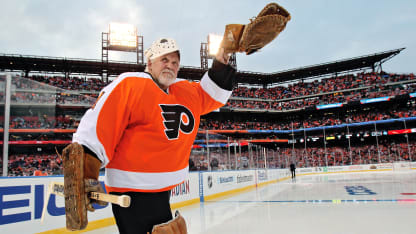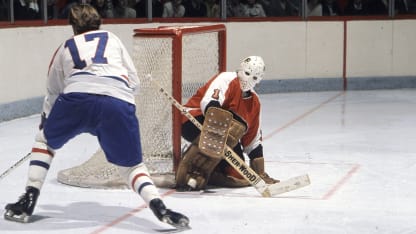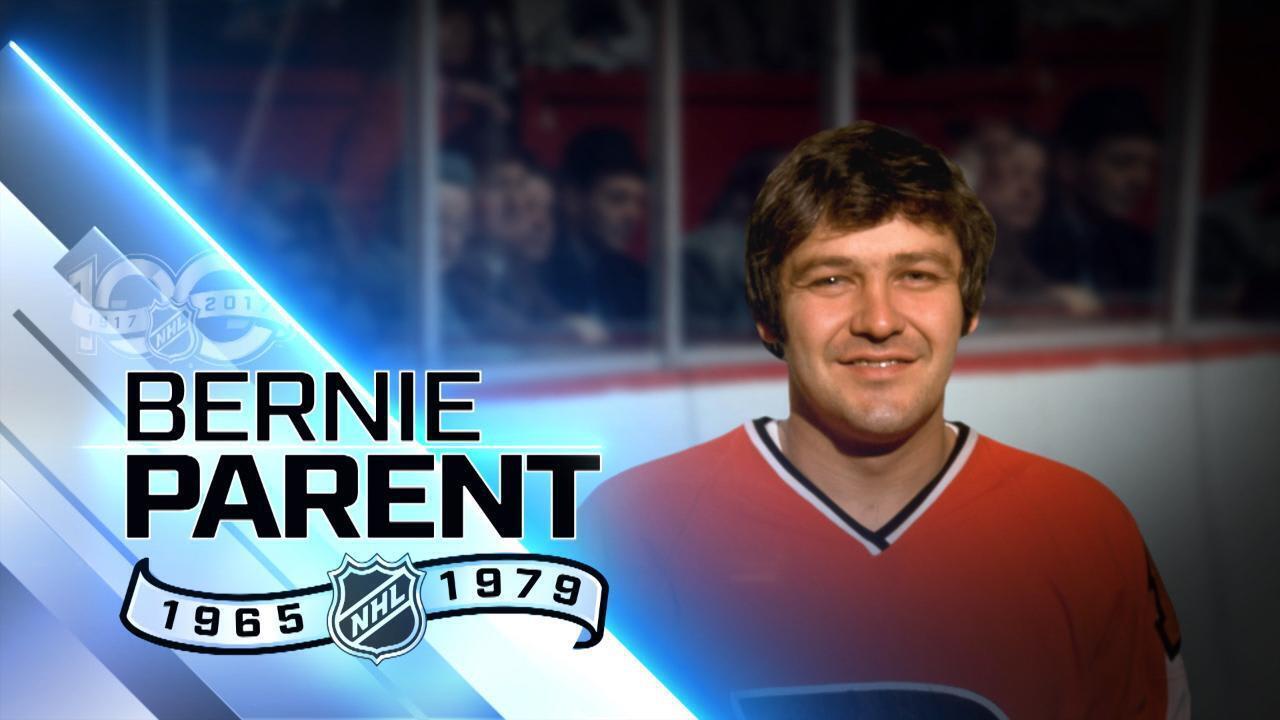Bernie Parent, whose goaltending keyed the Philadelphia Flyers’ back-to-back Stanley Cup championships in the mid-1970s and a member of the Hockey Hall of Fame, died Sunday. He was 80.
© Len Redkoles/NHLI via Getty Images
On a team nicknamed the “Broad Street Bullies,” Parent’s superb play was the key to the only two championships in Flyers history.
“Bernie Parent’s foreboding white mask was the last sight you wanted to see if you were an opposing shooter with a big game on the line,” NHL Commissioner Gary Bettman said in a statement. “The grinning, welcoming face that mask protected was the first you wanted to see when you walked into a room. At his unbeatable, unflappable best on the ice when the stakes were highest, Bernie was a warm, gregarious bear of a man off the ice who was venerated in Philadelphia and adored throughout the hockey world.
“Having already established himself as a top NHL goaltender in seven seasons with Boston, Philadelphia and Toronto, Parent soared to rare heights upon returning to the Flyers in 1973 after a year in the WHA. In two of the finest consecutive seasons by a goalie in NHL history, Parent won back-to-back Vezina Trophies and Conn Smythe Trophies, backstopping the Flyers to Stanley Cup triumphs in 1974 and 1975. His 47 regulation victories in 1973-74 remain the League’s single-season record.
“His No. 1 having been retired by the Flyers in 1979, Parent was inducted into the Hockey Hall of Fame in 1984 and selected as one of the NHL’s Top 100 Players of all time in 2017. His work with Ed Snider Youth Hockey and Education was only the most visible of the many ways in which he gave back to the city of Philadelphia and served as an ambassador for hockey. The entire National Hockey League family mourns the passing of this beloved icon and sends its deepest condolences to his wife, Gini, his family, and his countless fans and friends.”
Parent earned trust with two of the greatest seasons ever by an NHL goaltender. From 1973-75 he won 91 games, 24 by shutout, and earned the Vezina Trophy each time. The Flyers became the first expansion team to win the Stanley Cup in 1974 and repeated in 1975, with Parent winning the Conn Smythe Trophy as playoff MVP each time.
But his career ended abruptly on Feb. 17, 1979, when an errant stick entered the right eyehole of his mask during a game against the New York Rangers. Parent was hospitalized for two weeks but sustained permanent damage to his vision and retired at age 34.
The Flyers retired his No. 1 on Oct. 11, 1979. He was inducted into the Hall of Fame in 1984 and named to the 100 Greatest NHL Players in 2017.
“When Parent is out there, we know we can win games we have no business winning,” Fred Shero, his coach, said in summarizing the faith the Flyers had in their goaltender.
The end of Parent’s career signaled the beginning of a down period in his life. But he rebounded and worked for Philadelphia as a goaltending coach during the 1980s and early 1990s. After that, he served as an ambassador for the Flyers, one whose legacy, charm and sense of humor enabled him to remain as one of the most popular athletes Philadelphia has ever known.

© Denis Brodeur/NHLI via Getty Images
Parent was born on April 3, 1945, in east Montreal; he grew up idolizing Canadiens goaltender Jacques Plante. As a teenager, he helped the Niagara Falls Flyers win the Memorial Cup in 1965.
Parent signed with the Boston Bruins and turned pro that fall. However, he was left unprotected in the 1967 NHL Expansion Draft and was selected by Philadelphia. Parent was among the NHL’s best young goaltenders in his early years, but he never had a winning record while playing for the offensively challenged Flyers. With management desperate for more offense, Parent was sent to the Toronto Maple Leafs as part of a three-way trade midway through the 1970-71 season.
Though devastated at the time, Parent teamed with Plante, who was near the end of a Hall of Fame career, to form a formidable duo.
“He’s probably got more natural ability than any goaltender in this league,” Plante said.
Parent signed with the Miami Screaming Eagles of the new World Hockey Association in 1972, but that franchise never took the ice and he wound up with the Philadelphia Blazers instead. However, the Blazers fared poorly and he left the team in 1973 during a contract dispute. He did not want to return to Toronto, which still held his NHL rights, so he was traded Parent back to the Flyers.
“I never wanted to leave in the first place,” Parent said of Philadelphia after signing a multiyear contract with the Flyers. “Now that I’m back, I couldn’t be happier.”

Bernie Parent backstopped Flyers to back-to-back Cups
Parent spent the next two seasons in a zone the likes of which had rarely been seen in NHL history. He played 73 of the Flyers’ 78 regular-season games in 1973-74 and set the NHL single-season record for wins (47) that stood for more than three decades. He also led the NHL a 1.89 goals-against average and 12 shutouts. Parent then went 12-5 in the playoffs, including a 1-0 victory against Boston in Game 6 of the Final that brought the Stanley Cup to Philadelphia.
There was no Cup hangover for Parent in 1974-75. He won 44 games, 12 by shutout, and finished with a 2.03 GAA. Parent was even better in the playoffs, going 10-5 with a 1.89 GAA and four shutouts, including a 2-0 victory against the Buffalo Sabres in Game 6 of the Final that wrapped up the Flyers’ second straight championship.
Parent missed most of the 1975-76 season with a neck injury that bothered him for the rest of his career; he had 271 victories when the eye injury forced him to retire. After that, his lone goaltending appearance came against the Rangers in the alumni game at the 2012 Bridgestone NHL Winter Classic, when he played the first five minutes and stopped all five shots he faced.
His legacy with the team remained strong, and he never ceased to appreciate what he meant to his fans.
“The Flyers, starting with [chairman Ed] Snider, have done a great job as far as keeping us alive in front of the public as the years go by,” he told the Philadelphia Inquirer in December 2010. “It’s been 30-some years. Three different generations came along, and yet 10-year-old kids ask: ‘Can I have your autograph?’ When you look at this, you say it’s got to come from their parents, and the tradition goes on. It’s just a beautiful thing.”


You must be logged in to post a comment.